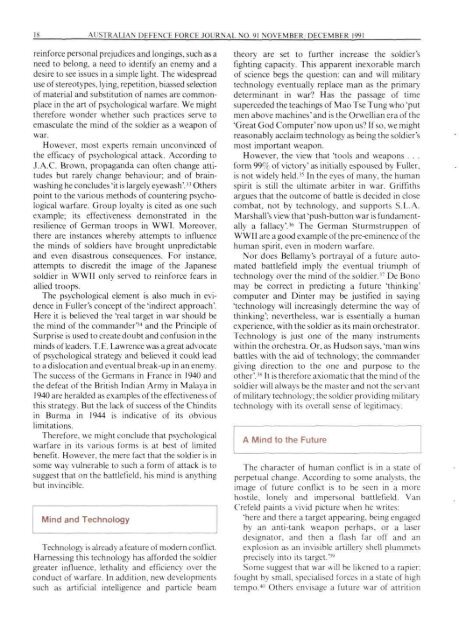ISSUE 91 : Nov/Dec - 1991 - Australian Defence Force Journal
ISSUE 91 : Nov/Dec - 1991 - Australian Defence Force Journal
ISSUE 91 : Nov/Dec - 1991 - Australian Defence Force Journal
Create successful ePaper yourself
Turn your PDF publications into a flip-book with our unique Google optimized e-Paper software.
18 M S| KM IAN 1)111 AC 1 KiR( 1 l()l RN M NO Dl NOW MB1 R DFC I MBI R I'NI<br />
reinforce personal prejudices and longings, such as a<br />
need to belong, a need to identify an enemy and a<br />
desire to see issues in a simple light. The widespread<br />
use of stereotypes, lying, repetition, biassed selection<br />
of material and substitution of names are commonplace<br />
in the art of psychological warfare. We might<br />
therefore wonder whether such practices serve to<br />
emasculate the mind of the soldier as a weapon of<br />
war.<br />
However, most experts remain unconvinced of<br />
the efficacy of psychological attack. According to<br />
J.A.C. Brown, propaganda can often change attitudes<br />
but rarely change behaviour; and of brainwashing<br />
he concludes 'it is largely eyewash'." Others<br />
point to the various methods of countering psychological<br />
warfare. Group loyalty is cited as one such<br />
example; its effectiveness demonstrated in the<br />
resilience of German troops in WW1. Moreover,<br />
there are instances whereby attempts to influence<br />
the minds of soldiers have brought unpredictable<br />
and even disastrous consequences. For instance,<br />
attempts to discredit the image of the Japanese<br />
soldier in WWII only served to reinforce fears in<br />
allied troops.<br />
The psychological element is also much in evidence<br />
in Fuller's concept of the 'indirect approach'.<br />
Here it is believed the 'real target in war should be<br />
the mind of the commander' 14 and the Principle of<br />
Surprise is used to create doubt and confusion in the<br />
minds of leaders. T.E. Lawrence was a great advocate<br />
of psychological strategy and believed it could lead<br />
to a dislocation and eventual break-up in an enemy.<br />
The success of the Germans in France in 1940 and<br />
the defeat of the British Indian Army in Malaya in<br />
1940 are heralded as examples of the effectiveness of<br />
this strategy. But the lack of success of the Chindits<br />
in Burma in 1944 is indicative of its obvious<br />
limitations.<br />
Therefore, we might conclude that psychological<br />
warfare in its various forms is at best of limited<br />
benefit. However, the mere fact that the soldier is in<br />
some way vulnerable to such a form of attack is to<br />
suggest that on the battlefield, his mind is anything<br />
but invincible.<br />
Mind and Technology<br />
Technology is already a feature of modern conflict.<br />
Harnessing this technology has afforded the soldier<br />
greater influence, lethality and efficiency over the<br />
conduct of warfare. In addition, new developments<br />
such as artificial intelligence and particle beam<br />
theory are set to further increase the soldier's<br />
fighting capacity. This apparent inexorable march<br />
of science begs the question: can and will military<br />
technology eventually replace man as the primary<br />
determinant in war? Has the passage of time<br />
superceded the teachings of Mao Tse Tung who 'put<br />
men above machines' and is the Orwellian era of the<br />
'Great God Computer'now upon us? If so, we might<br />
reasonably acclaim technology as being the soldier's<br />
most important weapon.<br />
However, the view that 'tools and weapons . . .<br />
form 999c of victory'as initially espoused by Fuller,<br />
is not widely held. 15 In the eyes of many, the human<br />
spirit is still the ultimate arbiter in war. Griffiths<br />
argues that the outcome of battle is decided in close<br />
combat, not by technology, and supports S.L.A.<br />
Marshall's view that 'push-button war is fundamentally<br />
a fallacy'. 16 The German Sturmstruppen of<br />
WWII are a good example of the pre-eminence of the<br />
human spirit, even in modern warfare.<br />
Nor does Bellamy's portrayal of a future automated<br />
battlefield imply the eventual triumph of<br />
technology over the mind of the soldier." De Bono<br />
may be correct in predicting a future 'thinking'<br />
computer and Dinter may be justified in saying<br />
'technology will increasingly determine the way of<br />
thinking'; nevertheless, war is essentially a human<br />
experience, with the soldier as its main orchestrator.<br />
Technology is just one of the many instruments<br />
within the orchestra. Or, as Hudson says, 'man wins<br />
battles with the aid of technology; the commander<br />
giving direction to the one and purpose to the<br />
other'."* It is therefore axiomatic that the mind of the<br />
soldier will always be the master and not the servant<br />
of military technology; the soldier providing militarytechnology<br />
with its overall sense of legitimacy.<br />
A Mind to the Future<br />
The character of human conflict is in a state of<br />
perpetual change. According to some analysts, the<br />
image of future conflict is to be seen in a more<br />
hostile, lonely and impersonal battlefield. Van<br />
Crefeld paints a vivid picture when he writes:<br />
'here and there a target appearing, being engaged<br />
by an anti-tank weapon perhaps, or a laser<br />
designator, and then a flash far off and an<br />
explosion as an invisible artillery shell plummets<br />
precisely into its target. rw<br />
Some suggest that war will be likened to a rapier:<br />
fought by small, specialised forces in a state of high<br />
tempo. 4 " Others envisage a future war of attrition

















